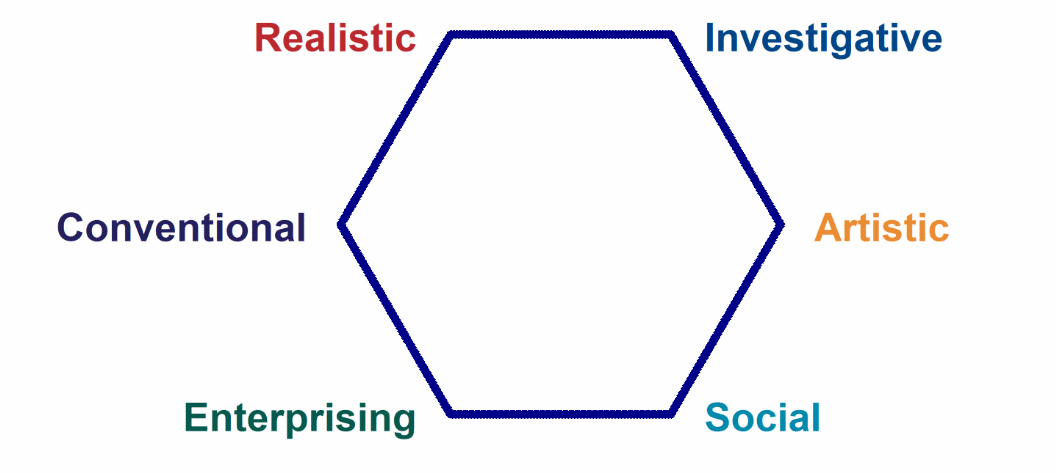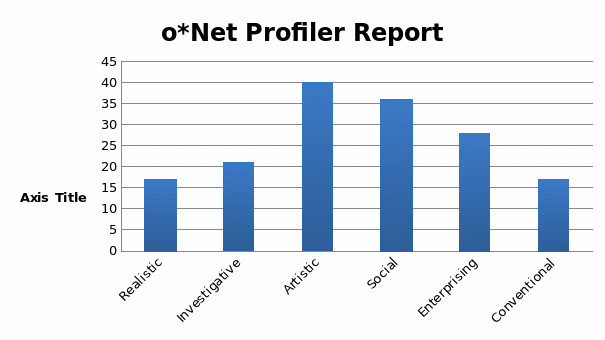Self-Direct
Both the Self Directed Search and O*Net profiler provide information on how people choose careers. In fact, the O*Net profiler is the most used inventory in the world. The personality types below forms the Holland hexagon that is used to show the similarities and differences among the personality types. It also shows the relationship amongst the six personality types to help in determining where one belongs and the type of career that one is able to excel.

According to the Holland hexagon above, each personality type provides the variations among career choices. At the same time, it provides the relationship between one personality type and the other. For example, investigative and realistic personality types tend to have the same interests. However, social and realistic dispositions never work together. Conventional people usually work well with either realistic or enterprising persons. However, they cannot work well with the social or investigative personality types (Huttchinson, 2001).
Using the interest profiler, an individual can come up with a career choice. The profiler contains a set of 60 questions whereby one responds by choosing among five answers that include ‘Strongly Dislike’, ‘Dislike’, ‘Unsure’, ‘Strongly Like’, and ‘Like’. These answers are represented in abbreviation as SD, D, U, SL, and L. At the outset, the scorecard takes the individuals through several interests to determine where they fir best (My Next Move, 2015).
According to the O*Net profiler report my interests scored as follows.

Case Study
Abstract
This essay aims at comparing the results obtained from the self-directed search and O*Net profiler tools with a view of investigating various career options and personal interests. The self-directed search is based on the theory that people are usually classified in six different types of personalities that include realistic, investigative, artistic, social, enterprising, and conventional. It enables an individual come up with a better career choice depending on one’s personality types.
The participant had not been involved in any other career counseling in the institution. The following details show the client’s case history that reflects various career choice issues and interventions suggested by the counselor with regard to the current labor market. For purposes of confidentiality the individual was referred to as client X. As a part of this report, a student in a need of career guidance was used in the case study interview.
The case indicates that the client was particularly interested in her elder brother’s career choice. This situation triggered inevitable thoughts that convinced her to change her first career. This client sought guidance to change her career during the second semester. At this time, she was feeling low. As a result, she opted to receive counseling outside the University.
Case Study
The client presented in this case believed that her poor performance was directly linked to her unhappiness in the course her studies. For this reason client X felt like her dream was not being realized. She also had repeated problems with her voice, which was vital to her profession.
After going through several sessions with the client, she decided to pick a new postgraduate program to enable her move to a new career. However, this situation was met will several issues that included course accreditation and course tuition fee. As a part of the intervention, the program of her choice suspended thereby stopping her endeavors meaning that her career break had been approved.
At this time, the only choice client X had was to rely on changeable work while still feeling desperate and helpless. Due to the career break, she ran into financial setbacks among other impediments that increased her stress levels thereby affecting her health.
However, during the interview sessions, client X admitted that she had not made up her mind. This situation meant that she was not ready to take a postgraduate program. She was looking for change, as she wanted to move away from home. For this reason, she decided to join the institution in the first place.
After one year of studies in the institution, she made up her mind on what she wanted to pursue as a career. The counselor realized that the client had changed positively since she seemed confident the first time she attended the sessions. In the recurrent sessions, the client became more confident, happier, and calm. She used gestures as she revealed what she intended to choose as her postgraduate course.
The Super’s Life Span Model
This report entails a case study where it highlights some of the challenging issues requiring counseling interventions experienced by a client when determining a profession. The career counselor job is to support the client through career development and analysis issues that arise (Reid & West, 2011).
The case study is based on the Super’s lifespan model in the current career guidance practice. This case study uses the Super’s lifespan approach in career guidance with regard to individual concepts, narrative paradigm, and biographical hermeneutics. The theory was necessary in the study as it enabled the clients to be more active in leading their careers (Ali & Graham, 2006).
McMahon and Patton (2006) believe that people usually hypothesize a meaning in their career lives based on the decisions and actions they take. Therefore, career counseling is important during this time as it helps them describe and evaluate their constructs. It provides an opportunity to develop skills that incorporate career management, resilience, and decision-making (Kidd, 2014).
The emphasis is placed on the personal and professional relationships with regard to social and economic institutions, unfolding careers over time, emotional resilience, and progression in learning and working (Ali & Graham, 2006). Resilience is important as it enables the individual deal with the challenges and successes of their careers that can only be maintained when they feel confident, flexible, hopeful, and self-reliant besides having a high self-esteem (McMahon & Patton, 2006).
Research Interventions
Once individuals undergo career counselling, they realize life themes that help them contend with the various social anticipations that take them a step higher (McMahon & Patton, 2006). At this level, they can solve challenges that pertain to attitudes, beliefs, and value systems. The accomplishment of such goals requires them to develop various coping mechanisms that help them adopt to their chosen careers (McMahon & Patton, 2006).
The individuals also develop more concern about their future endeavors. They also seek understand the difference between self-realization and the labor market. This knowledge helps them avoid indecisions that can lead to loss of focus and vagueness (Ceu & Moreno, 2003). Client X’s vocational personality and life theme continued to shape her career. This state of affairs compelled her to become more efficient and goal-oriented. This method showed that her level of adaptability was significant.
Dialogue
Interviewer: What are the benefits of the career counselling session?
Client X: The career counseling sessions enabled me to discover and learn a lot about my personality. I realized that I was flexible besides being able to face challenges. This situation brought about more confidence that worked out for me. As I wait to enroll in my new post graduate course, my mind, and conscience are now settled to the career. The counselling session has also enabled me to re-negotiate my career decision through several sessions. This state of affairs shows that this model enables an individual to choose from several interventions that pave way for leading a comfortable career choice. This method is not prescriptive.
Interviewer: Has the session helped you choose the right career?
Client X: The career counselling brought about self-realization that is paramount to the selection of appropriate careers. As a result, I did not have to choose new courses in the middle of the studies.
Interviewer: Do you think that career counselling is important in the selection of courses?
Client X: Definitely, career counseling is paramount to the selection of career choices. However, it should be dynamic when dealing with students and other working clients who think they should change their choices. Besides, it is important as it takes the individuals through a journey of personal development that constantly constructs, deconstructs, and reconstructs them every time.
Therefore, a career guidance counselor is important in this group. It should decide on an approach that integrates career and non-career issues. It is also important to realize one’s limit as a career counselor in addition to concentrating more on the client needs during the intervention.
Reference List
Ali, L., & Graham, B. (2006). The Counselling Approach to Careers Guidance. London: Routledge.
Ceu, T., & Moreno, R. (2003). Guidance Theory and Practice: The Status of Career Exploration. British Journal of Guidance and Counselling, 31(2), 189-208.
Huttchinson, P. (2001). Measuring the Success of the Holland Hexagon. New York, NY: Kluwer Academic Publishers.
Kidd, J. (2014). Understanding Career Counselling, Theory, Research and Practice. London: SAGE Publications.
McMahon, M., & Patton, W. (2006). Career Counselling: Constructivist Approaches. London: Routledge.
My Next Move. (2015). Web.
O*Net Centre. (2015). Web.
Reid, H., & West, L. (2011). Telling Tales: Using Narrative in Career Guidance. Journal of Vocational Behavior, 78(2), 174-183.